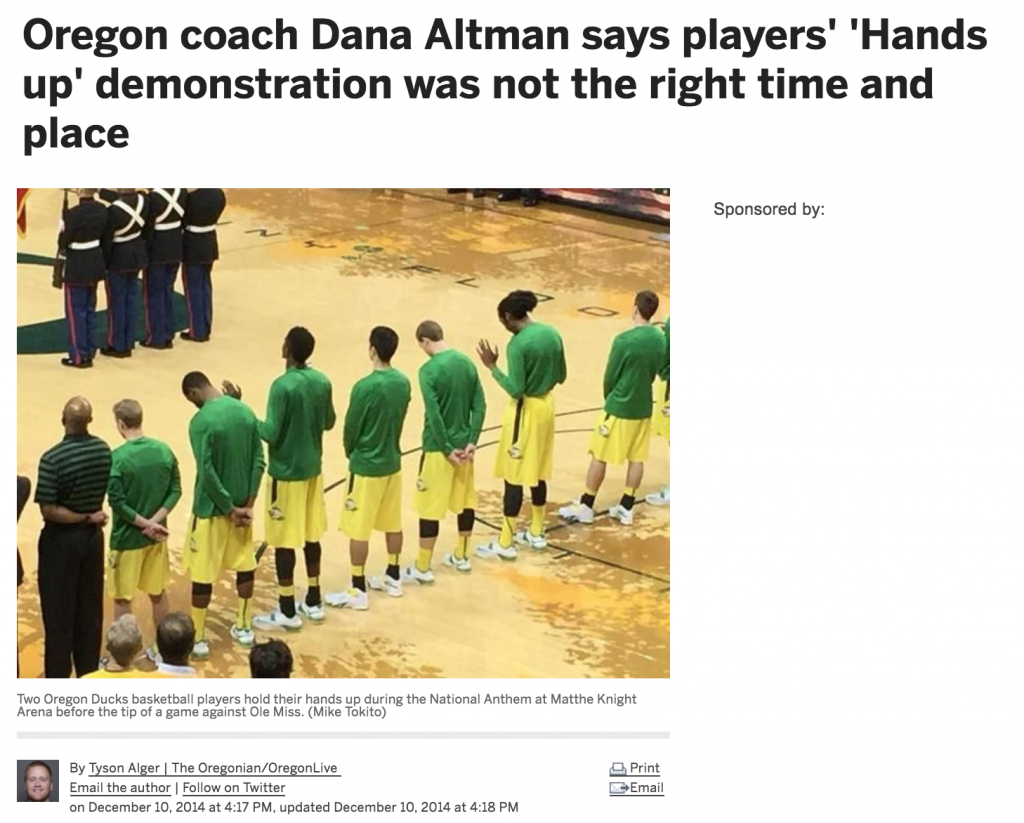From: Bill Harbaugh <harbaugh@uoregon.edu>
Subject: Oregonian Op-Ed and UO Senate Resolution.
Date: July 8, 2018 at 8:52:09 PM PDT
To: gilleyb@pdx.edu
Cc: Chris Sinclair <csinclai@uoregon.edu>, ASUO President <asuopres@uoregon.edu>, Mike Schill <pres@uoregon.edu>, John Nicols <nic@uoregon.edu>, Chris Phillips <ncp@uoregon.edu>
Dear Professor Gilley –
I read your Oregonian Op-Ed today at https://www.oregonlive.com/opinion/index.ssf/2018/07/oregon_campuses_need_intellect.html
There’s much I agree with. However I want to set the record straight regarding the UO Senate resolution that you mention. I was UO Senate Vice President last year (and am president this year), and I helped write the resolution. You seem to have mis-read it as supporting the “hecklers’ veto”. It does not. It clearly states:
2.1 BE IT THEREFORE RESOLVED that the UO Senate supports the rights of students to peacefully protest during university events, even disruptively, so long as those protests do not prevent speakers from being heard and the audience from hearing what they have to say;
This is the latest in a series of Senate actions that have all taken the same stand – supporting the rights of speakers, and protesters, to be heard. Here is the explanation I gave to the UO Board of Trustees last month:
… Second, I want to explain the Senate’s resolution “In Support of the UO Student Collective”. This is the group of students that disrupted President Schill’s “State of the University”speech in October.
… [UO President Schill] has said that with this resolution the Senate endorsed the sorts of disruption of classes by students who might object to something about the course content, as has occurred at other universities, such as Reed and Evergreen, where students have essentially shut down courses on particular subjects.
This is not at all what our Senate has endorsed. The resolution states clearly:
2.1 BE IT THEREFORE RESOLVED that the UO Senate supports the rights of students to peacefully protest during university events, even disruptively, so long as those protests do not prevent speakers from being heard and the audience from hearing what they have to say;
https://senate.uoregon.edu/entry/?Motions=US17/18-02
I’m not a lawyer, but this language is consistent with everything I understand about the First Amendment, everything I believe about academic freedom, and everything that UO’s other policies on these matters state. People have a right to speak, and those who object to that speech have the right to have their objections heard even if that disrupts and causes inconvenience for the speaker and the audience.
What those who object cannot do, and again I quote from our resolution, is prevent speakers from being heard and the audience from hearing what they have to say.
Our resolution does not endorse the sorts of disruptions that prevent faculty, or our President, from teaching what they want to teach or saying what they want to say. It specifically speaks against that, only allowing “disruption” so long as that disruption doesn’t prevent the professor’s lecture, or for that matter the President’s talk, from continuing.
Our resolution does not endorse allowing the actions of the Students Collective taking the podium and shutting down President Schill’s address – although it does call for some leniency in their subsequent discipline, and some reforms to make sure free speech discipline cases are handled with special care. These were students, after all.
If this is not clear, please see the UO policy on Academic Freedom, which the Senate passed in 2014 and which the UO President signed, which states:
The University’s responsibility to help students to think critically and independently requires that members of the university community have the right to investigate and discuss matters, including those that are controversial, inside and outside of class, without fear of institutional restraint. It is the responsibility of speakers, listeners and all members of our community to respect others and to promote a culture of mutual inquiry throughout the University community.
Or see the UO Policy on Freedom of Inquiry and Free Speech, which we passed in 2010, which states:
The University supports free speech with vigor, including the right of presenters to offer opinion, the right of the audience to hear what is presented, and the right of protesters to engage with speakers in order to challenge ideas, so long as the protest does not disrupt or stifle the free exchange of ideas.
I don’t see how the Senate and the faculty could be any more clear about our position, and I’m tired of hearing people misrepresent it. Though of course I’m open to any arguments, even disruptive ones.
Thank you. Questions?
I hope that this makes clear that this UO Senate resolution is not a good example of faculty opposition to free-speech, and that you will search for a better one to use instead.
I’m posting this on the UO Senate website, and I’m ccing professor Chris Sinclair (Math), who was Senate President when this motion passed, the current ASUO student president, UO President Mike Schill, as well as UO professors John Nicols (History) and Chris Philips (Math) since they are the UO NAS members that I know.
Thanks,
Bill Harbaugh
Economics Prof & Senate Pres
University of Oregon
http://senate.uoregon.edu




